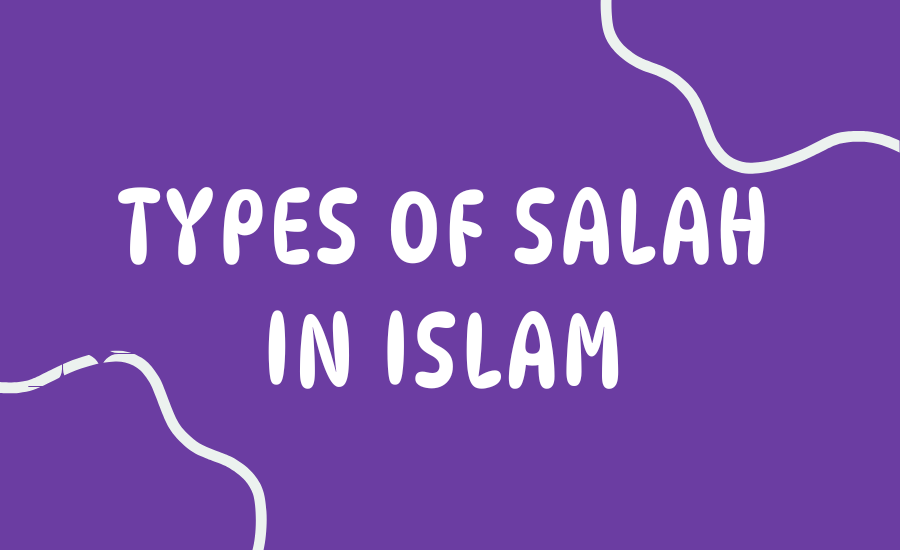Salah (prayer) is the heartbeat of a Muslim’s faith i.e. the act that connects the servant directly with the Creator. It is not just a ritual but a spiritual lifeline, a means of purification, guidance, and peace. Every time a believer stands in prayer, they are standing before Allah, seeking mercy, forgiveness, and closeness to Him.
In Islam, Salah is not one uniform act; it is divinely structured into different categories, each carrying its own purpose and reward. Some are obligatory and non-negotiable, while others are highly encouraged and full of blessings. Understanding these types of prayers helps a Muslim maintain a balanced worship routine, one that fulfills obligations and seeks extra nearness to Allah.
The four primary types of Salah are:
- Fard (obligatory prayers): the foundation of daily worship.
- Wajib (required prayers): essential but slightly below Fard in obligation.
- Sunnat (recommended prayers): those consistently practiced by the Prophet Muhammad (peace be upon him).
- Nafl (voluntary prayers): optional acts of devotion that earn immense spiritual reward.
In this comprehensive guide, we will explore these four types of Salah in detail with authentic Quranic verses, Hadith references, and practical insights — so you can understand how each form of prayer enriches your relationship with Allah and strengthens your daily connection to Him.
1. Fard (Obligatory Prayers)
Fard Salah refers to the mandatory prayers that every adult Muslim must perform. Missing a Fard prayer deliberately is considered a major sin, and it must be made up (Qaza) as soon as possible. Allah says in the Quran:
Arabic:
إِنَّ الصَّلَاةَ كَانَتْ عَلَى الْمُؤْمِنِينَ كِتَابًا مَّوْقُوتًا
Transliteration: Inna as-salata kanat alal mu’mineena kitaban mawqoota
Translation: “Indeed, the prayer has been decreed upon the believers a decree of specified times.” – (Surah An-Nisa, 4:103)
This verse confirms that performing Salah at its appointed time is a command from Allah and cannot be neglected.
There are five daily Fard prayers:
- Fajr: 2 Rakats (obligatory)
- Dhuhr: 4 Rakats (obligatory)
- Asr: 4 Rakats (obligatory)
- Maghrib: 3 Rakats (obligatory)
- Isha: 4 Rakats (obligatory)
These are known as the Five Daily Prayers (Salawat al-Khams), and performing them consistently is one of the most important signs of faith. Here is a hadith on Importance of fard salah:
Arabic:
رَأْسُ الأَمْرِ الإِسْلامُ، وَعَمُودُهُ الصَّلاةُ
Transliteration: Ra’sul amri al-Islam, wa ‘amuduhu as-salah
Translation: “The head of the matter is Islam, and its pillar is the prayer.” – (Sunan At-Tirmidhi, 2616)
The Prophet Muhammad (peace be upon him) made it clear that Salah is the pillar of Islam, and without it, one’s faith is incomplete.
2. Wajib (Required Prayers)
Wajib Salah refers to the prayers that are almost as obligatory as Fard, but with a slightly lesser degree. Denying them is not disbelief, but neglecting them regularly is sinful. Below are the examples of wajib prayers:
- Witr Prayer: 3 Rakats performed after Isha Salah.
The Prophet (PBUH) said:
“Make Witr as the last prayer of your night.” – (Sahih Bukhari, 998; Sahih Muslim, 751)
- Eid Prayers: 2 Rakats of Eid al-Fitr and Eid al-Adha Salah.
These are also considered Wajib according to the Hanafi school of thought.
- Sajda Tilawat (Prostration of Recitation): When a verse of prostration is recited, performing one Sajda is Wajib.
The Prophet Muhammad (PBUH) said:
“Witr is a duty for every Muslim.” – (Sunan Abu Dawood, 1416)
This shows that Witr Salah holds a special significance and should not be left out deliberately.
3. Sunnat (Recommended Prayers)
Sunnat Salah refers to the prayers that the Prophet Muhammad (PBUH) regularly performed in addition to the obligatory ones. They are divided into two categories:
- Sunnat Muakkadah (Emphasized Sunnah): strongly recommended and regularly performed by the Prophet.
- Sunnat Ghair Muakkadah (Non-Emphasized Sunnah): occasionally performed but still highly rewarding.
Below are examples of sunnat muakkadah
- 2 Rakats before Fajr
The Prophet (PBUH) said:
“The two rakats before Fajr are better than this world and everything in it.” – (Sahih Muslim, 725)
- 4 Rakats before Dhuhr and 2 Rakats after
- 2 Rakats after Maghrib
- 2 Rakats after Isha
Below are some examples of sunnat ghair muakkadah:
Performing these Sunnah prayers adds beauty, reward, and completion to one’s Fard Salah. The Prophet (PBUH) said:
“Whoever prays twelve Rakats during the day and night, Allah will build for him a house in Paradise.” – (Sahih Muslim, 728)
This includes the Sunnah Muakkadah prayers surrounding the five obligatory ones.
4. Nafl (Voluntary Prayers)
Nafl prayers are optional acts of worship that bring immense reward and nearness to Allah. They are not obligatory, but performing them reflects deep devotion and love for Allah. Below are examples of nafl prayers:
- Tahajjud (Night Prayer): prayed after sleeping for a part of the night.
- Salat al-Duha (Forenoon Prayer): prayed after sunrise and before Dhuhr.
- Istikhara Prayer: to seek guidance from Allah in decision-making.
- Awwabin Prayer: 6 Rakats after Maghrib.
- Salat al-Tasbeeh: a special Nafl prayer for forgiveness and spiritual cleansing.
The Prophet (PBUH) said:
Arabic:
مَا تَقَرَّبَ إِلَيَّ عَبْدِي بِشَيْءٍ أَحَبَّ إِلَيَّ مِمَّا افْتَرَضْتُ عَلَيْهِ
وَلَا يَزَالُ عَبْدِي يَتَقَرَّبُ إِلَيَّ بِالنَّوَافِلِ حَتَّى أُحِبَّهُ
Transliteration: Ma taqarraba ilayya abdi bi shay’in ahabba ilayya mimma iftaradtu alayh, wa la yazalu abdi yataqarrabu ilayya bin-nawafil hatta uhibbahu
Translation: “My servant does not draw near to Me with anything more beloved to Me than what I have made obligatory upon him, and My servant continues to draw near to Me through voluntary deeds until I love him.” – (Sahih Bukhari, 6502)
This hadith shows that Nafl prayers lead to Allah’s love i.e. the highest spiritual reward a believer can achieve.
Summary Table of Salah Types
Below is a list compilation of different types of Salah in the form of a table:
| Type of Salah | Obligation Level | Examples | Ruling if Missed |
| Fard | Obligatory | 5 daily prayers | Major sin, must make up (Qaza) |
| Wajib | Required | Witr, Eid prayers | Sinful to neglect |
| Sunnat Muakkadah | Strongly recommended | 2 before Fajr, 2 after Maghrib | Blameworthy if neglected often |
| Sunnat Ghair Muakkadah | Recommended | 4 before Asr | Rewardable, no sin if missed |
| Nafl | Voluntary | Tahajjud, Duha | Rewardable, not sinful if missed |
Living a Balanced Life of Worship: Fard, Sunnat, and Beyond
Salah is not just a duty, it is a gift and a privilege from Allah. Every type of Salah, from Fard to Nafl, strengthens our connection with Him and polishes our hearts. While the Fard Salah is the foundation of our faith, the Wajib, Sunnat, and Nafl prayers complete and beautify our worship. Just as a house looks incomplete without decoration, our faith shines brighter when we perform extra prayers for Allah’s pleasure. So, make it a habit to perform your Fard Salah regularly, and add Sunnah and Nafl prayers to your routine to rise in spiritual rank and gain Allah’s eternal love.
Frequently Asked Questions (FAQs)
How many types of Salah are there in Islam?
There are four main types of Salah in Islam: Fard (obligatory), Wajib (required), Sunnat (recommended), and Nafl (voluntary). Each has a different level of obligation and reward, but all bring a Muslim closer to Allah when performed sincerely.
What are the five Fard (obligatory) prayers?
The five Fard prayers are Fajr 2 Rakats, Dhuhr 4 Rakats, Asr 4 Rakats, Maghrib 3 Rakats, and Isha 4 Rakats. These are mandatory for every adult Muslim and must be performed on time daily.
What is the difference between Fard and Wajib prayers?
Fard prayers are strictly obligatory i.e. missing them deliberately is a major sin and must be made up (Qaza). Wajib prayers are also necessary, but with a slightly lesser obligation. Missing them regularly is sinful, but denial of them does not remove one from Islam.
Are Sunnat prayers obligatory?
No, Sunnat prayers are not obligatory, but they are highly recommended. Performing them completes and beautifies one’s Fard Salah and brings immense reward from Allah.
What are Nafl prayers?
Nafl means voluntary. These are optional prayers a Muslim can pray at any time (except the prohibited hours) to earn extra reward. Examples include Tahajjud, Duha, Awwabin, and Istikhara. They bring spiritual peace and strengthen one’s relationship with Allah.
Can Nafl or Sunnah prayers make up for missed Fard Salah?
No, Nafl or Sunnah prayers cannot replace missed Fard Salah. If someone misses a Fard prayer, they must perform Qaza (make-up) for it. However, Nafl and Sunnah prayers can increase your rewards and bring forgiveness for other shortcomings.
Can women also perform all these types of Salah?
Yes, men and women are equally encouraged to perform all types of Salah i.e. Fard, Wajib, Sunnat, and Nafl. The rulings of obligation and reward are the same for both, except for certain cases of exemption like menstruation or postpartum bleeding.
Can I pray Nafl or Sunnah at any time?
Most Nafl prayers can be prayed any time, except during three prohibited periods i.e. after Fajr until sunrise, when the sun is at its zenith (just before Dhuhr) and after Asr until sunset. Avoiding these times is part of maintaining the adab (etiquette) of Salah.







One Response
Some truly nice stuff on this website , I love it.